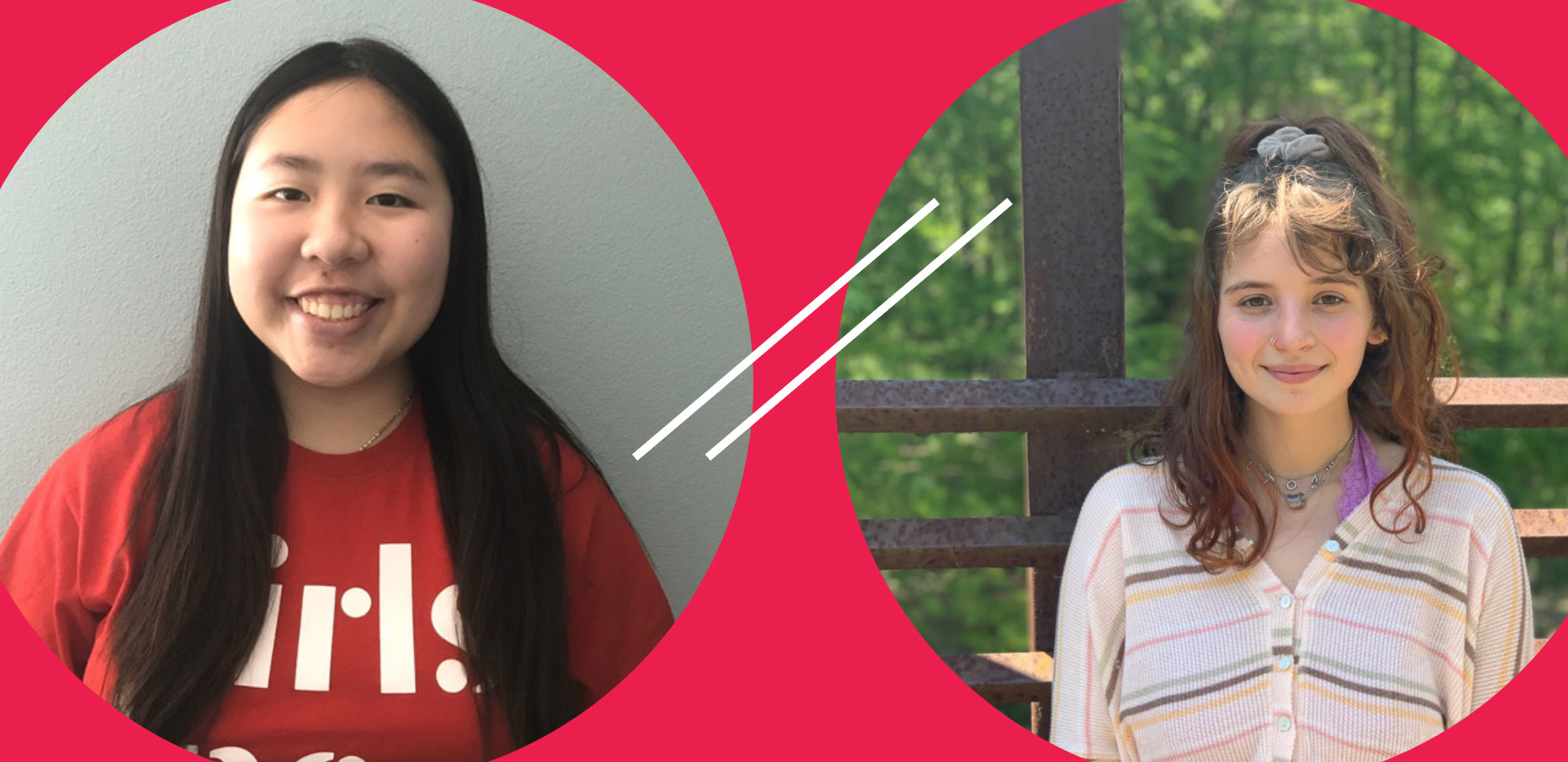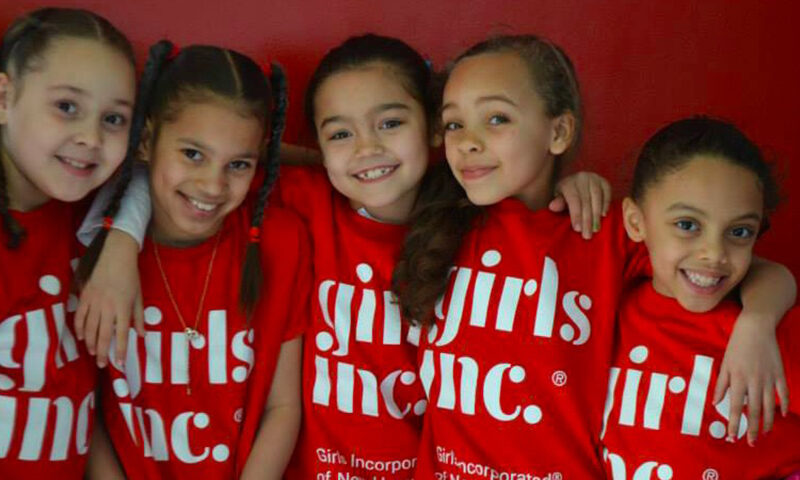Two Girls Inc. girls chat mental health ‘musts’ in a time of crisis
Libbe, 18, is a member of the Girls Inc.Teen Advocacy Council and a Girls Inc. of Orange County girl. Lizzie is a Girls Inc. Public Policy Intern in Washington, D.C. Together, they share their strategies for staying mentally healthy during COVID-19.
Around the world, everyone is adjusting to new routines and change in response to COVID-19. This is true for girls too. Many Girls Inc. girls are coping with big changes in their lives: schools moving to remote learning, plans being postponed, cancelled, or reimagined, and the difficulties of staying connected to friends and loved ones virtually. Some girls are handling the additional stress of caring for younger siblings, or even loved ones who might be vulnerable to contracting the virus.
As a college student, my life has been turned upside down by COVID-19. I’ve lost a semester with many friends who are graduating, learning has become increasingly hard, my student activism has been cut short for the foreseeable future, and I miss my campus’s sense of community. Recognizing the toll that COVID-19 has had on my mental health, I sat down with Libbe, 18, a member of the Girls Inc. Teen Advocacy Council from Girls Inc. of Orange County to see what her experience has been. The Council serves as ambassadors for Girls Inc. National, helping us stay aware of local issues and opportunities, and working to mobilize their peers on issues of top concern to girls. Libbe and I spoke about what has been weighing on her mind, and how she is managing to prioritize her mental health amidst all this change.
Keep a routine
“Start a routine… I try to get myself to get ready as if I was going to school. I try to change my clothes and get up, and it may not follow along with my school routine but I’m still out of bed.” -Libbe
- Work becomes infinitely harder when you are doing it in the same sweatpants from three days ago and experts agree. Routines help us maintain some order in our lives when everything else seems to be uncertain, according to the National Alliance on Mental Illness.
- Without a routine, individuals often spend too much time thinking about things out of our control.
- Routines don’t have to be complicated, they can be as simple as finding a time when you will shower, get dressed (even if you’re not dressing up), and eat.
- Creating a schedule including activities you must do, and activities you want to do, and writing them down can help you stay accountable.
- Make sure breaks and personal care are a part of your schedule too.
Take breaks
“I give myself breaks. For example, I do things with my family, chat with friends, watch a couple videos. To help me feel relaxed, I take time to paint.” – Libbe
- We live in a time where technology is constantly at our fingertips, for most, but we all need a break sometimes. It’s important to note that some, like many girls we serve, still do not have access to technologies that many see as necessities.
- We can stay in touch with loved ones while in isolation even if we can not be together physically. However, it also means that we will not have a break from these demands, unless we give ourselves a rest.
- It can be helpful to avoid feeling burnt out by carving out time in your day to go on a walk, call a friend (if you need a break from your family), listen to music, read a book, write some poetry, or play a board game with whoever you’re quarantined with.
- There are also free apps like Color Therapy or Calm that can help guide you through mindfulness and other relaxation techniques when you need to clear your head and take a break from the noise around you.
Be honest with teachers and supervisors
“Most [teachers] offer support. They understand this is a tough time for a lot of people so they are a lot more flexible if you message them and open up to them.” -Libbe
- Don’t be afraid to ask for help, extensions, or some flexibility from people in your life. Everyone is trying to figure out how to adapt their lives in this new environment.We are learning to maneuver work, school, family, and everything in between during these uncertain times. Libbe talked about how, for many of her teachers, she had to be the one to reach out first and admit she was struggling. This didn’t make them any less understanding of her struggles.
- If people report to you, remember that they are under an added amount of stress right now and be compassionate. We can all use some additional support and we shouldn’t be afraid to ask for it.
Get out of Bed
“[I recommend] distinguishing between the areas [in your home] that are for breaks and the ones that are for work. Personally, I go downstairs and do work in my dining room or at my desk instead of in my bed. That has really helped me.” – Libbe
- It is all too tempting to work from bed, and we’ve all been there. However, doing work in the same place that is usually reserved for sleep and rest can make it a less peaceful space, affecting your sleep.
- Boundaries are essential in ensuring that your work and home remain separated. The New York Times suggests you “Pick a spot for your office. It doesn’t have to have a door [or be elaborate], but it should be away from distraction.”
- It’s hard to stay focused when your fuzzy blanket and favorite pillow are calling your name. Take it from me, it’s best to stay productive away from your bed. In the long run, this will lead to better sleep which will also help spark productivity and create a better routine for you as you work from home.
- Moving around will also help separate your day and create a (small) sense of normalcy.
Connect with others (and yourself)
“I try to get myself to do more personal projects, or play a game with my sister and just have that time to sit and relax” -Libbe
- The future is filled with uncertainty, which leads to A LOT of stress about things we can’t control. Libbe herself spends much of her time worried about those in her community who do not have access to a stable income, or even food. Connecting with others is an outlet to help you divert your attention away from the 24-hour news cycle, and towards those who love and care about you.
- Concerns about yourself, your loved ones, and your greater community are 100% valid, but they also take a huge toll on your mental health. Libbe suggests board games, walks together, or even just a conversation with no technology to distract you. Check in on each other right now, and maybe even reconnect with an old friend.
This is a challenging time for everyone but it affects different groups in exceedingly different ways. Many of the same inequalities that have long persisted in our society have been exacerbated by the virus: often at the intersection of race, class, and gender. Asian Americans have seen an influx in hate crimes; Libbe, who identifies as Asian American, shared “how she is seeing people getting beat up in the streets, in different areas” and also experiencing hate online. African Americans have been affected, and are dying from, the coronavirus at disproportionate rates due to decades of structural inequality. Many low-income people don’t have the resources they need or the luxury of staying home when they have no choice but to work. These challenges create an increase in health concerns for many, but also exacerbate the toll Coronavirus takes on mental health for those already facing inequalities.
Despite the differences in the way coronavirus has impacted certain groups, after our conversation, I realized that many of us are facing the same fundamental grief. As Libbe puts it, “I feel that, as time has been going on, you just lose your patience, more and more, and you just want to leave, and you can’t. So if there was a word I had to chalk it up to, it’s frustration. A lot of frustration.”
Additional Mental Health Resources
Because asking for help is ALWAYS an option.
National Eating Disorder Association Helpline provides support for those struggling with eating disorders.
National Suicide Prevention Lifeline – Call 800-273-TALK (8255)
If you or someone you know is in crisis, whether they are contemplating suicide or not, for 24/7.
Crisis Text Line – Text NAMI to 741-741 for 24/7 support via text.
Teen Line– Text “TEEN” to 839863 between 6:00pm-9:00pm PST if you’re a teen looking to talk to another teen for help or guidance.
The Parent Support Network– provides parents who are concerned about their children’s mental health with an opportunity to find and support each other in a confidential and safe space. Now offering ZOOM meetings open to all.
National Domestic Violence Hotline – Call 1-800-799-SAFE (7233) or text “LOVEIS” to 22522 if you are someone you know is being abused.
National Sexual Assault Hotline – Call 800-656-HOPE (4673) or at the Online Hotline for 24/7 support for sexual assault survivors.


